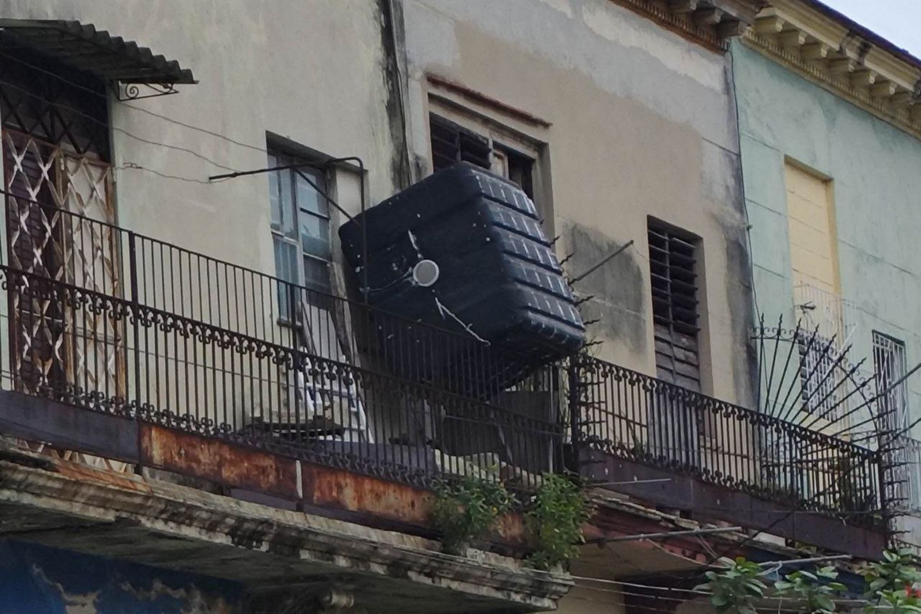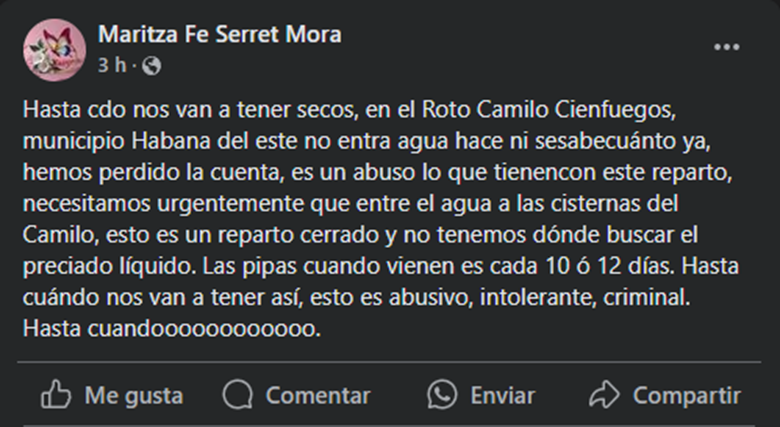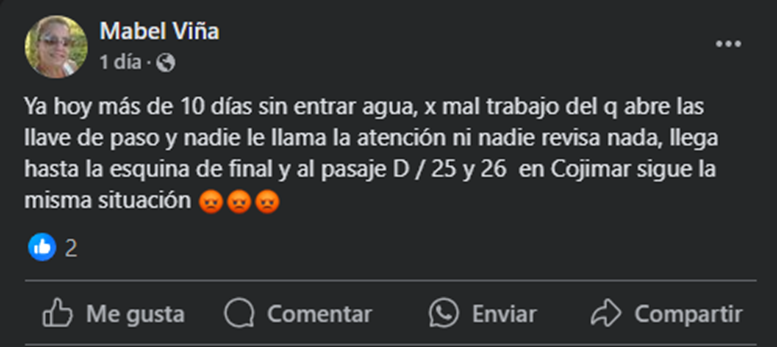We support our Publishers and Content Creators. You can view this story on their website by CLICKING HERE.
The water crisis in Cuba has reached alarming levels, affecting more than a million people facing a severe shortage of this vital resource. The causes of this situation are varied, from the electrical deficit to the deterioration of hydraulic infrastructure, which has plunged the island into a constant cycle of scarcity, as a result of the Cuban regime that has left its people in misery.
This issue is not just a matter of daily survival for Cubans but also a reflection of the deep flaws in the country’s political and economic model, which for decades has postponed real solutions.
The water shortage in Cuba is not a recent phenomenon. For years, Cubans have dealt with a deficient supply due to chronic problems in the distribution network.
However, in recent times, the situation has significantly worsened. More than a million people lack constant access to potable water due to a combination of electrical failures and broken equipment that prevent the proper operation of hydraulic pumps.
The inefficiency of Cuba’s hydraulic infrastructure has been a recurring problem. Many of the pumping and water distribution systems have exceeded their useful life, and the lack of proper maintenance has led to their collapse.
Moreover, the energy deficit on the island has aggravated the situation. Without enough electricity, pumping plants cannot operate at full capacity, leaving entire communities without access to water for days or even weeks.
Impact on Public Health and Social Well-being
The lack of access to potable water not only affects the quality of life for Cubans but also puts their health at risk. Water is essential for basic hygiene, food preparation, and the prevention of diseases.
Without a constant supply, the risk of waterborne diseases, such as cholera or gastrointestinal infections, increases significantly.
According to an article from 14ymedio, many Cubans, in their desperation, turn to unsafe water sources like rivers, wells, and untreated cisterns. These alternatives are not only unsuitable for human consumption but also expose the population to dangerous pathogens.
«My neighbor used to have his terrace full of ferns, very beautiful ones, now he got rid of the plants and put two 750-liter tanks each.»

The man details how he joined a Facebook page called «Water Victims of Havana.» In that virtual community, dozens of messages are posted daily, most of them like desperate cries in the face of dry pipes and the lack of response from the state company. «We are in the desert,» says one user, and another responds that the official monopoly is «a terrorist group» that plays with the patience of the Cuban people.



Health authorities have warned about the risks, but the solutions offered are limited, as the water treatment infrastructure is as deteriorated as the distribution system.
Electricity and Water: A Vicious Cycle of Inefficiency
Cuba’s electrical system is another key factor in the water crisis. With constant blackouts and power cuts, many water treatment plants and pumps cannot operate properly.
The interdependence between the electricity supply and access to water creates a vicious cycle: without electricity, there is no water, and without water, the living conditions of the population deteriorate rapidly.
According to CubitaNOW, Cuban authorities have attempted to alleviate the situation with emergency measures, such as using tanker trucks to distribute water in the most affected areas. However, these solutions are insufficient and temporary. The trucks cannot meet the demand of an increasingly desperate population, and the infrastructure continues to collapse with no long-term solution in sight.
The Government’s Role: Negligence or Incompetence?
The Cuban government’s response to this crisis has been criticized by many as insufficient and lacking transparency. The authorities have admitted that the water shortage is a serious problem, but the solutions offered have been limited.
Here is the link to the Havana Government’s Facebook page, so you can check out their «solutions»… Havana Government.

Rather than implementing comprehensive plans to modernize the infrastructure, the government has opted for short-term measures, such as importing equipment for some areas, but without a sustainable plan.
The water crisis is just another example of the incompetence of the socialist system, which has prioritized propaganda over the basic needs of the population. For years, the government has diverted resources towards ideological projects, while essential services like potable water and electricity have been relegated to the background.
What Solutions Exist?
Solving Cuba’s water crisis will require significant investment in modernizing the hydraulic infrastructure. This includes not only repairing treatment plants and distribution networks but also implementing more efficient technologies to ensure the sustainable use of the resource.
However, any plan of this kind will face serious obstacles, including the chronic lack of financial resources of the Cuban government, which is ironic given how much the regime pockets from, for example, Cuban medical missions, where the salaries of Cuban doctors sent internationally are skimmed by over 80%. If you want more information on this topic, here is the link:
A long-term solution would also involve improving the electricity supply, allowing pumping plants to operate consistently. However, Cuba’s energy crisis is as deeply rooted as its water crisis, and any attempt to resolve it will require profound changes in the country’s economic policy… impossible for a leftist government to look after the welfare of the people and undertake these much-needed works.
The Role of the International Community
The international community could also play a key role in helping Cuba overcome this crisis. International organizations and foreign governments «could» (but don’t want to) provide technical and financial assistance to improve the island’s water and energy infrastructure.
However, this will only be possible if the Cuban government accepts external cooperation and commits to implementing structural reforms to ensure that aid reaches those who need it most.
So far, the regime has shown little interest in opening up to this type of cooperation, which has led many to question whether it is truly committed to solving the problem or simply seeks to maintain the status quo, as the regime does not care about its people.
How can there be well-being with hunger, blackouts, misery, a shortage of drinking water, long lines, lack of public transportation, no medicine, a collapsed healthcare system, and crime rampant every day?
In a time when water resources are more valuable than ever, the lack of access to potable water in Cuba is a reminder of the importance of responsible governments committed to the welfare of their people. For Cubans, sadly and unjustly, water has become a luxury they cannot afford to lose.
Joana Campos es abogada y editora con más de 10 años de experiencia en la gestión de proyectos de desarrollo internacional, enfocada en la sostenibilidad y el impacto social positivo. Actualmente dirige JC Editorial, donde ha coordinado la edición y distribución de libros de reconocidos autores internacionales y la logística de numerosas giras nacionales. Además, se desempeña como Administradora General en Medicina Integradora, gestionando la clínica y generando proyectos en diversas áreas. Anteriormente, trabajó como abogada corporativa, especializándose en derecho penal y corporativo. Joana es licenciada en Derecho por la Universidad de Guadalajara.
Joana Campos is a lawyer and editor with over 10 years of experience in managing international development projects, focusing on sustainability and positive social impact. She currently leads JC Editorial, where she has coordinated the editing and distribution of books by renowned international authors and managed the logistics of numerous national tours. Additionally, she serves as the General Administrator at Medicina Integradora, overseeing the clinic and generating projects in various areas. Previously, she worked as a corporate lawyer, specializing in criminal and corporate law. Joana holds a law degree from the University of Guadalajara.

 Conservative
Conservative  Search
Search Trending
Trending Current News
Current News 


